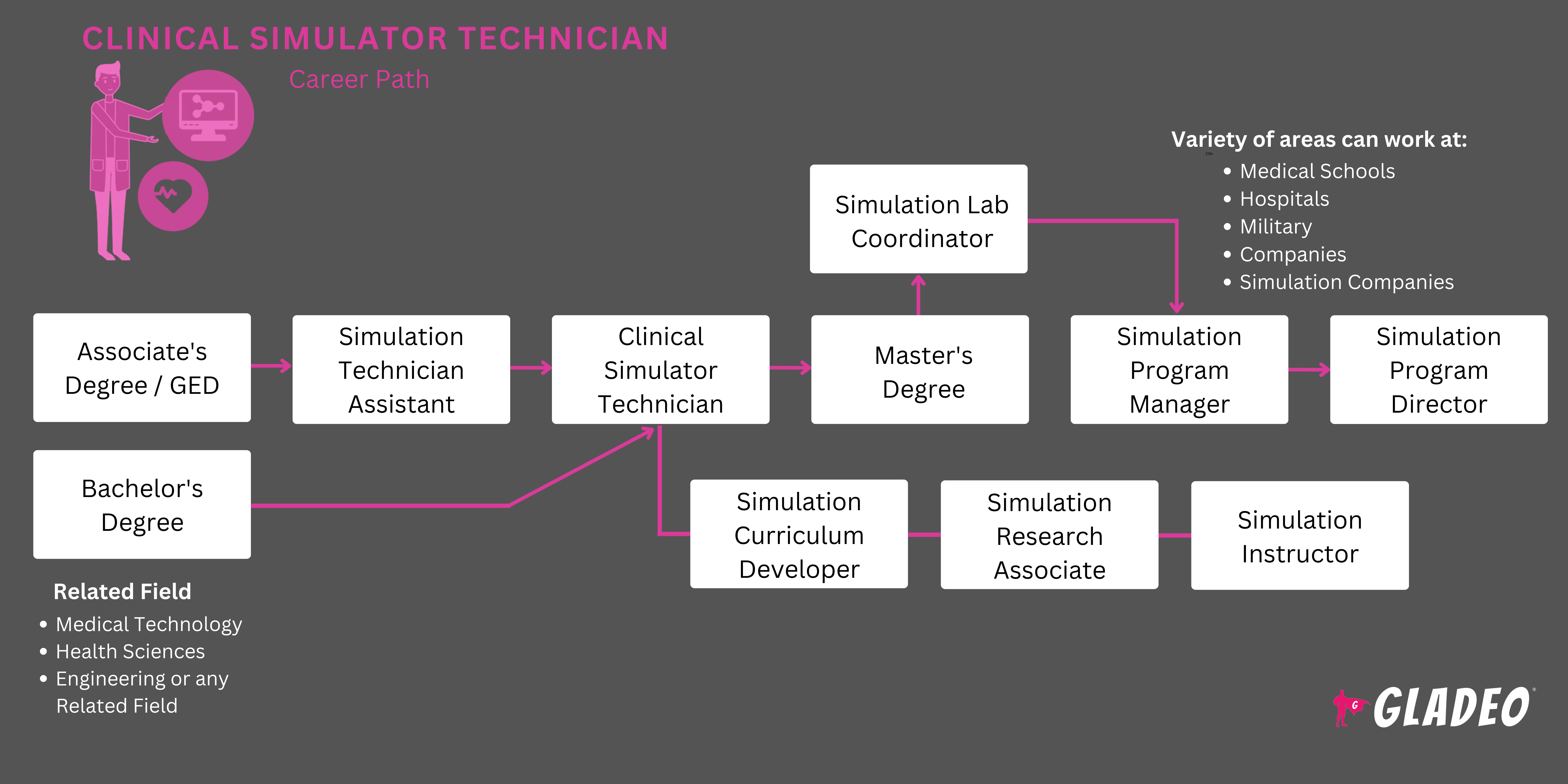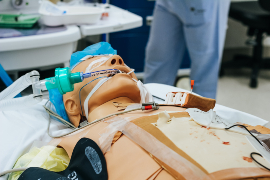聚光灯
模拟技术专家、模拟操作专家、模拟技术员、医学模拟协调员、模拟实验室助理、医疗保健模拟技术员、模拟中心经理
The best way to master a skill is through practice! But how do medical students practice performing procedures on patients? One way they learn is through advanced clinical simulations that mimic the environment and conditions without a real patient involved.
These sophisticated simulations rely on a range of computers, programs, audiovisual equipment, and props, requiring the expertise of a Clinical Simulation Technician to prepare and oversee everything.
Clinical Simulation Technicians (aka “Sim Techs”) may program or operate the software involved, set up mannequins, ensure all the needed supplies are available, and guide students through the role-playing learning experiences. In addition, they schedule activities, conduct routine maintenance on Simulation equipment, manage inventory, update software, record sessions, and procure new items, as needed.
We may not hear about them much, but these skilled technicians help to ensure medical students get the thorough training needed to safely work with real patients!
- Enhancing the quality of healthcare training
- Contributing to the readiness of healthcare professionals
- Indirectly improving patient care as part of a healthcare training team
工作日程
- Clinical Simulation Technicians work full-time, with the possibility of irregular work schedules.
典型职责
- Set up patient simulators, task trainers, hospital equipment, supplies, and audiovisual equipment for simulation activities
- Maintain equipment such as IV pumps, ventilators, anesthesia machines, and defibrillators
- Program software to simulate physiological changes and interventions
- Use software to produce pre-programmed or spontaneous scenarios
- Apply moulage (special effects makeup for mock injuries) to enhance scenario realism
- Provide audiovisual support including equipment for live streaming, reviewing simulation activities, video production, etc.
- Conduct on-site maintenance for simulators, including cleaning, parts replacement, and troubleshooting
- Manage equipment and supply inventories, including IT assets and software
- Research and purchase new technologies to ensure the training curriculum and materials are current
- Operate learning management systems for recording simulations, managing case information, and tracking learner engagement
- Schedule simulation activities. Develop case scenarios, setup guidance, and documentation
额外责任
- Help training staff with simulation technology and practices
- Work with hospital teams, handle movable video equipment, and make sure training materials are kept separate from actual supplies
- Recruit participants for simulation exercises
- Participate in research on simulation effectiveness
- Coordinate with vendors for equipment purchase and repair
- Help integrate simulation findings into curriculum development
- Keep updated with advancements in simulation technology and healthcare education
软技能
- 适应性
- 分析性的
- 注重细节
- 创造性
- 批判性思维
- Ethical judgment
- 独立性
- Interpersonal and communication skills
- 解决问题的能力
- 讲故事
- 团队合作
- 时间管理
技术技能
- Clinical Simulation Technicians will need technical skills related to:
- Simulation software and hardware operation (e.g., Laerdal, CAE Healthcare, etc.)
- Basic programming for medical scenario creation
- Basic filmmaking skills. Use of audiovisual recording and editing tools
- Understanding of medical terminology and procedures
- Maintenance and troubleshooting of equipment, simulators, task trainers, etc.
- Equipment may include: IV pumps, bronchoscopes, medstations, chromophase lights, ventilators, cauterizing machines, overhead monitors, glidescopes, patient beds, defibrillators, blood warming systems, vitals monitoring stands, laparoscopy machines, and humidified oxygen systems
- Familiarity with educational theory and methods
- Knowledge of healthcare regulations related to training and education
- Skills in applying moulage (special effects makeup for mock injuries)
- Educational institutions (colleges, universities, medical schools)
- Hospitals and healthcare facilities with simulation centers
- Professional training organizations
- 政府卫生部门
Clinical Simulation Technicians need a passion for technology and education. Their detailed tasks involve meticulous attention to detail and a commitment to continuous learning. The scenarios they set up and execute are essential for training the next wave of medical professionals, so it’s vital to ensure equipment and programs are up-to-date and that scenarios are portrayed accurately.
Sim Techs have a lot of responsibility riding on their shoulders, but gain job satisfaction from knowing they’re contributing to better patient care and outcomes!
Healthcare simulation is evolving thanks to virtual reality and augmented reality technologies. These exciting new tools offer immersive, interactive training environments that are useful to augment learning.
There's also a growing emphasis on interprofessional education involving multiple healthcare disciplines, to facilitate better collaboration during real-world patient care situations such as in an intensive care unit. Another trend is the use of data analytics to evaluate how effective simulation training is and where it could benefit from improvements.
Individuals in this career likely had an interest in audiovisual technology or computer programming from an early age. They may have also enjoyed teaching others and participating in group projects or activities. Many Sim Techs probably enjoyed role-playing or simulation video games, too!
- Becoming a Clinical Simulation Technician requires a mix of education, technical skills, knowledge of healthcare practices, and relevant work experience
- Employers typically look for candidates with an associate degree in biomedical technology, healthcare simulation, audiovisual technology, science, or a related area
- Emergency medical technicians (EMTs) and licensed practical nurses (LPNs) make good candidates!
- Note, some roles may require a bachelor’s degree in nursing
- 常见的大学课程包括。
- Anatomy and Physiology
- Audiovisual Technology for Simulation
- Biomedical Equipment Technology
- Computer Programming for Simulation
- Healthcare Simulation Principles
- Instructional Design
- Technology in Healthcare Education
- 可选的认证包括。
○ Certified Healthcare Simulation Operations Specialist
○ Certified Healthcare Simulation Operations Specialist - Advanced
○ Certified Healthcare Simulation Educator
○ Certified Healthcare Simulation Educator - Advanced
- AVIXA - Certified Technical Specialist
- Clinical Simulation Technicians don’t necessarily have to go to a university. Some get started by training at a community college or vocational school.
- Choose programs that offer a blend of technical training, healthcare knowledge, and hands-on simulation experience.
- Look for internships or work-study opportunities in simulation labs.
- Review faculty biographies to see their experience with simulation technology.
- Check out the program’s facilities and current research.
- Find out if the school or program has connections with healthcare facilities and potential employers.
- Consider the affordability of the program and the availability of financial aid and scholarships!
- Focus on STEM subjects like physics, biology, and computer science
- Knock out Advanced Placement courses to prepare for college
Learn about audiovisual equipment use, video editing, virtual reality, and augmented reality - Hone your amateur filmmaking and production skills by participating in AV clubs
- Engage in school projects related to healthcare technology
- Before applying for a college major, consider getting a feel for the subject matter through some short online courses
- Coursera, Udemy, edX, and other sites may offer introductory courses in simulation technology or biomedical equipment
- Try out mobile apps like Full Code for game-like simulations designed by real medical practitioners
- Seek volunteer or part-time work in healthcare settings, educational technology departments, or AV support
- Go to simulation-related conferences and workshops to network and keep up with trends
- Follow simulation technology blogs like Medscape, scientistic journals, podcasts, and other industry news sources
- Keep a record of your achievements, projects, and skills for your resume
- Connect with professionals in the field for guidance
- Decide how you want to serve as personal references and get their permission to give out their contact information

- Visit your school’s career center for help preparing resumes and doing mock interviews
- Apply for entry-level positions, internships, work placements, or even simulation developer apprenticeships to get experience if needed
- Update your LinkedIn profile with simulation technology and healthcare education skills
- Network at medical simulation technology and healthcare education events
- Review postings on Indeed, Glassdoor, SimGHOSTS Career Center, and other job portals
- Note the keywords in job ads and incorporate them into your resume where possible, to help it get through applicant tracking system programs! Common keywords might include:
- 视听设备
- Healthcare education
- 库存管理
- Maintenance
- Medical equipment
- Programming
- Scenario development
- Simulation technology
- Technical support
- 培训
- Take a look at the Clinical Simulation Technician resume templates
- Think like the employer or hiring manager. Review the criteria they assess when they’re looking to hire a new Sim Tech!
- Review Clinical Simulation Technician interview questions and practice your replies in mock interviews with friends
- Be familiar with the technologies and terminology
- Dress appropriately for interviews!
- Seek advice from mentors and supervisors about career progression
- Continue learning through professional development courses or by earning certifications in simulation technology like the Society for Simulation in Healthcare’s Certified Healthcare Simulation Operations Specialist - Advanced
- Consider knocking out a higher-level degree. If you have an associate, go for your bachelor’s. If you have your bachelor’s, think about applying to graduate school
- Volunteer to take on more complex simulation projects and leadership roles
- Build relationships with educators, healthcare professionals, and technology vendors
- Specialize in areas like advanced technology use such as virtual reality and augmented reality in healthcare education
- Stay active in professional organizations such as the Association for Simulated Practice in Healthcare
- Contribute to forums, blogs, and journals. Present at seminars and conferences
- If needed to advance, consider relocating to look for jobs at larger organizations
网站
- 3B Scientific
- Association for Simulated Practice in Healthcare
- Audiovisual and Integrated Experience Association
- Body Interact
- Center for Medical Simulation
- 卫生信息学和信息管理教育认证委员会
- Digital Health Society
- Full Code
- Healthcare & Data Analytics Association
- 医疗保健信息和管理系统协会
- Healthy Simulation
- InSimu
- International Meeting on Simulation in Healthcare
- International Nursing Association for Clinical Simulation and Learning
- International Society for Pharmacoeconomics and Outcomes Research
- Medcases
- Medscape
- Mentice
- Oxford Medical Simulation
- SimGHOSTS
- SimX
- 医疗保健模拟协会
书籍
- Clinical Simulation: Education, Operations and Engineering, by Gilles Chiniara
- Clinical Simulation for Health Care Professionals, by Audrey L Zapletal, Joanne M Baird, et al.
- Mastering Simulation, Second Edition: A Handbook for Success, by Janice Palaganas, Beth Ulrich, et al.
Clinical simulations are crucial for the education and training of medical professionals around the world. Virtual and augmented reality technologies are changing the profession but it remains to be seen what impact they’ll have on future job growth for this career field. It’s also hard to pin down current employment figures for Clinical Simulation Technicians.
If you’re curious about exploring some career options with similar skill sets, check out our list below!
- Audio-Visual Specialist for Medical Simulation
- 生物学技术员
- 生物医学工程师
- Cardiovascular Technologist
- 化学技术员
- Chemist and Material Scientist
- Clinical Educator
- Cytogenetic Technologist
- 游戏开发者
- 紧急医疗技术员
- Healthcare Informatics Specialist
- 组织学技术员
- Instructional Designer
- Licensed Practical Nurse
- Medical and Clinical Laboratory Technologists
- Medical Equipment Technician
- 神经诊断技术员
- 核医学技术员
- Nursing Educator
- 抽血员
- Radiologic Technologist and Technician
- Special Effects Technician
- Veterinary Technologist and Technician
- 视觉效果主管
新闻联播

特色工作

在线课程和工具








